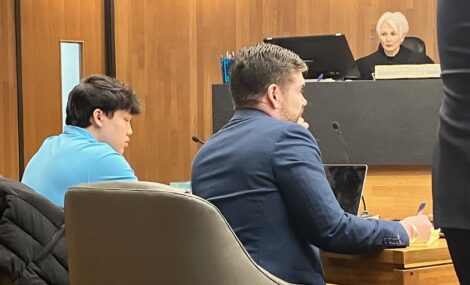Pathologist whose report led to Valdez dropping murder case testifies that baby died of natural causes, not abuse
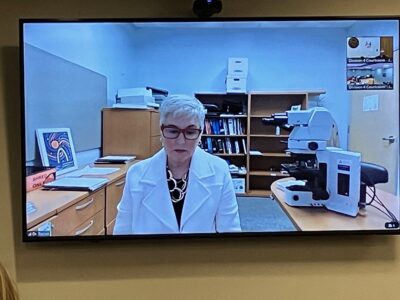
photo by: Kim Callahan/Journal-World
Forensic pathologist Dr. Jane Turner is pictured testifying Tuesday, Oct. 28, 2025, in Douglas County District Court.
Nine-month-old Oliver “Ollie” Ortiz died of natural causes, not child abuse: That’s what a forensic pathologist hired by the Douglas County District Attorney’s Office said almost three years ago, and that’s what she said again in testimony Tuesday — in the process, heaping implicit scorn on the coroner’s autopsy findings that said otherwise.
Forensic pathologist Jane Turner’s January 2023 report led then-DA Suzanne Valdez, who had hired her for a second opinion on Ollie’s cause of death, to cease prosecuting Carrody Buchhorn.
On Tuesday, the second day of Buchhorn’s wrongful conviction lawsuit against the State of Kansas, Dr. Turner testified via Zoom from Washington University in St. Louis for well over five hours about her findings regarding Ollie’s Sept. 29, 2016, death at the Eudora day care where Buchhorn worked.
Turner told the court that she saw no evidence, based on the materials supplied to her by the DA’s Office, that Ollie sustained an abuse injury that resulted in his death. Instead, she said, she found clear evidence that Ollie had suffered from patent foramen ovale (PFO), which is a hole in the wall between the two upper chambers of the heart, which normally closes after birth. The PFO combined with infections, she said, resulted in blood clots forming and traveling from the right side of his heart to the left side and blocking blood flow from the coronary artery, likely causing a heart attack and possibly a stroke.
The coroner, Dr. Erik Mitchell, had testified at Buchhorn’s trial seven years ago that traumatic abuse had caused “depolarization” of neurons in Ollie’s brain — a way of explaining a death when there’s no external evidence of head trauma. First responders had said they found no injuries on Ollie’s head.
Depolarization doesn’t exist, Buchhorn’s attorneys have argued, pointing to medical consensus and aggressively attacking it as “junk science.” And Valdez herself had said she wouldn’t rely on Mitchell’s testimony and findings in any future retrial.
Turner testified Tuesday that Mitchell could not truthfully describe Ollie’s heart, as he purported to do in the autopsy report, because he had removed it and sent it to a cardiac pathologist before he performed the autopsy. Mitchell’s report described the foramen ovale in Ollie’s heart as closed, which Turner said could not be reconciled with the finding of the heart expert, who found otherwise.
Turner also said that microbiology lab reports indicated that Ollie had suffered from an infection and that the lab had alerted Mitchell to the fact because such a finding is considered a “critical result” requiring notification. Mitchell, however, did not include the infection evidence in his autopsy report. Nor did he include the evidence the cardiac pathologist found regarding the PFO and ischemic damage to the heart, which results from lack of blood flow.
Mitchell also neglected to collect cerebrospinal fluid and vitreous fluid from the eyes, nor did he examine Ollie’s inner ear structure or look for blood clots — all of which could have provided important clues to Ollie’s demise, such as whether he definitively suffered from sepsis, which Turner couldn’t rule out, or untreated diabetes.
Mitchell also failed to take a full-body X-ray of Ollie, which Turner said should be done if child abuse is suspected.
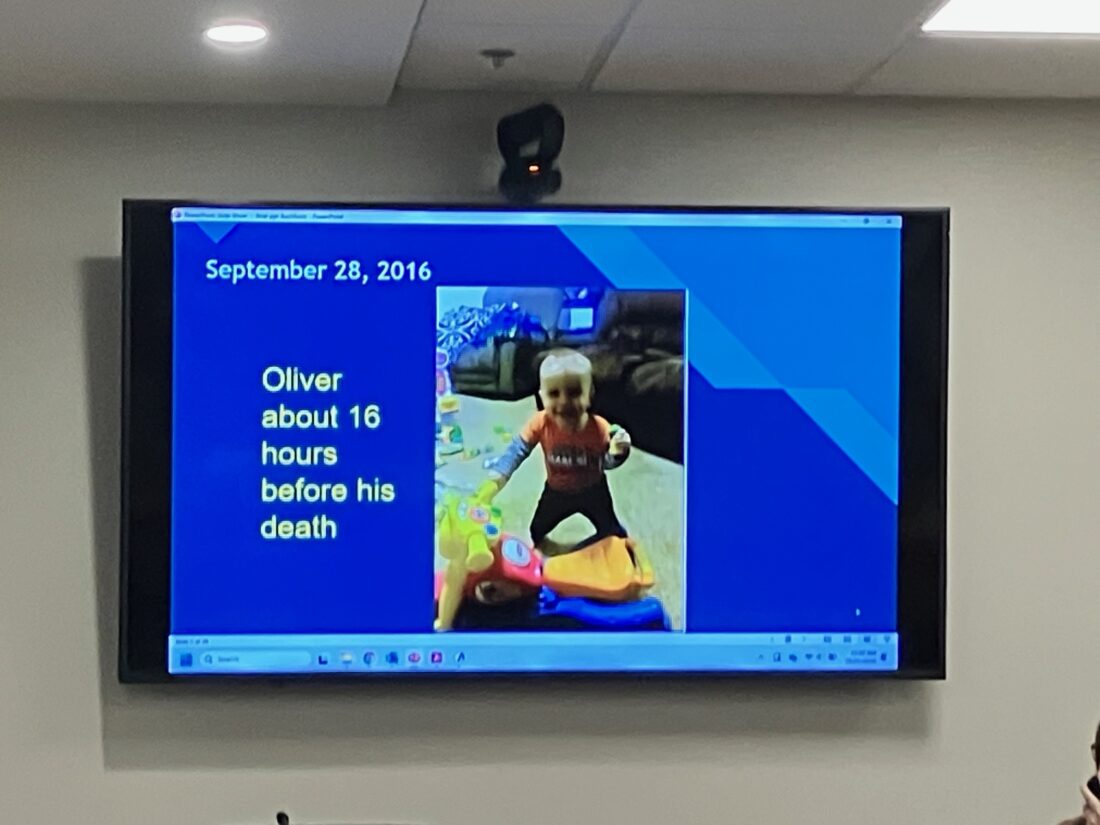
photo by: Kim Callahan/Journal-World Photo
Oliver “Ollie” Ortiz is pictured in this slide presented by the state during its opening argument on Monday, Oct. 27, 2025.
Turner testified that the ischemic damage, a stroke or heart attack, involved in Ollie’s death would have occurred between 12 and 24 hours prior to Ollie’s death and that it likely would have manifested as lethargy. Ollie was found unresponsive at the day care at 3:10 p.m. Sept. 29, 2016, so if he had experienced the damage in the middle of the night, it likely would have gone unnoticed, Turner said, and it was possible that he could have appeared more or less normal the next morning, as day care workers had said, save for an episode that was alternately described as vomiting or spitting up.
In her report Turner noted a day three weeks prior to Ollie’s death when he was sent home from day care because he seemed lethargic and unwell. She testified Tuesday that she believed that Ollie’s condition that day was likely related to what ultimately killed him. She also said it was possible that Ollie had suffered multiple strokes over time.
Turner also testified that Ollie lacked one of the cardinal signs of inflicted head trauma: hemorrhaging in the optic nerve sheaths, and she said that any injuries to his body, such as a torn liver or some bruising were likely the result of four different adults trying to forcefully resuscitate him with CPR for around an hour. Emergency medical responders had said they found no bruising on Ollie prior to the CPR attempts.
Turner said that a fracture on the back of Ollie’s skull, or a crack in the bone, is not unusual and that it can happen from a minor head injury that can go unnoticed. She testified that the fracture didn’t happen the day of Ollie’s death because it already showed signs of healing and lacked fresh blood within.
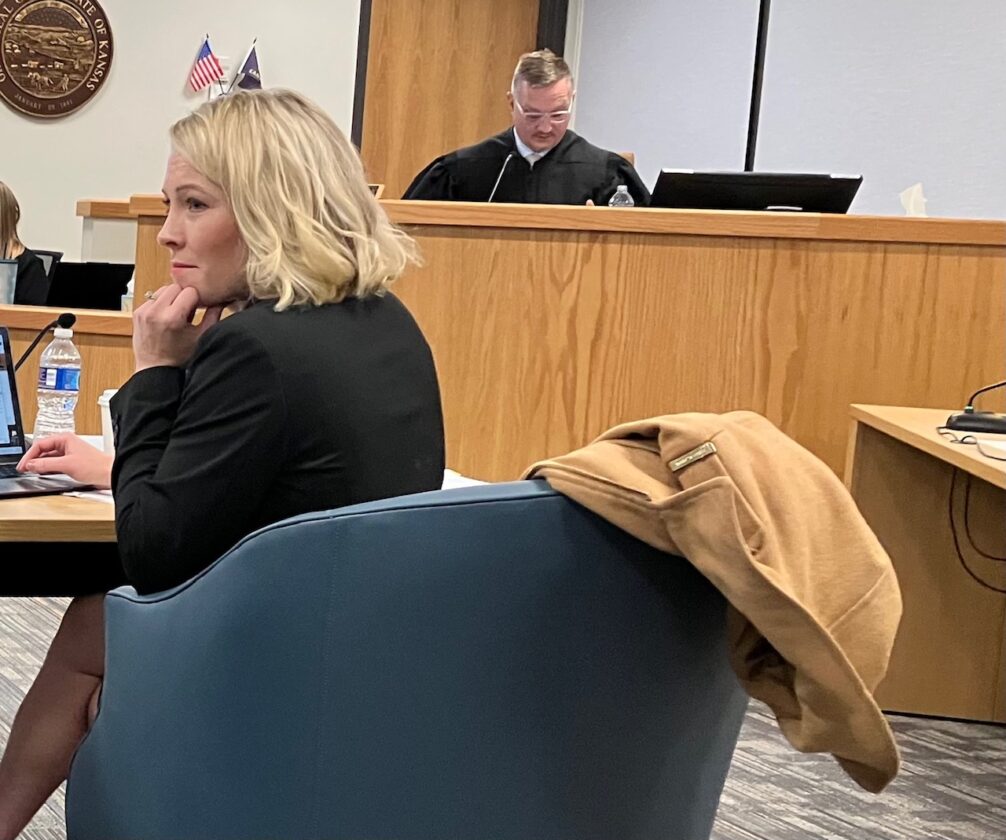
photo by: Kim Callahan/Journal-World
Mackenzie Baxter, an attorney for the state, is pictured Tuesday, Oct. 28, 2025, in Douglas County District Court. Chief Judge James McCabria is at right.
On cross-examination, an attorney for the state, Mackenzie Baxter, attempted to cast doubt on Turner’s qualifications and motivations, noting that she is neither a cardiologist nor a pediatrician, and had earned much of her income from expert witness fees. Baxter questioned whether Ollie’s PFO was really a heart defect per se since the condition is not uncommon, with an estimated 25% of the population having a PFO.
Turner said that as a forensic pathologist she had conducted over 5,000 autopsies, taught the subject at a prestigious university and was an editor at the American Journal of Clinical Pathology. She said that the American Heart Association considers a PFO a congenital heart defect, though she could not estimate in what percentage of people it leads to heart attack or stroke. In Ollie’s case, though, she said it was not simply the PFO, but the PFO in combination with infection and other issues that likely killed him.
Baxter also brought up that Turner had testified as an expert in at least three other cases where child abuse was suspected but where Turner had indicated that the cause of death was a sepsis infection leading to stroke, not abusive trauma. Judge James McCabria, who was presiding, asked Baxter for the names of those cases.
Baxter asked Turner if she was familiar with the problem-solving principle that the simplest explanation is often the correct one — apparently suggesting that abuse is the simplest explanation for Ollie’s death. Turner said she was familiar with the expression, also known as Occam’s Razor, but that it was “not a medical principle.”
Buchhorn’s attorney, Bill Skepnek, then asked if “depolarization” amounted to the simplest theory, and Turner said no.
Skepnek and his co-counsel, Quentin Templeton, have said that the state’s witness on Ollie’s death, pediatrician Terra Frazier, who might testify this week, is simply Mitchell — or depolarization — in different clothing.
In the final hour of the day, Gina Brunton, the day care owner, took the stand again after first testifying on Monday. Her testimony will continue on Wednesday.
As the Journal-World has reported, Buchhorn was convicted of second-degree murder in 2018. That conviction was overturned by the Kansas Court of Appeals in August 2021 because Buchhorn’s trial attorneys were deemed to have provided ineffective assistance of counsel by not doing enough to oppose Mitchell’s finding of depolarization as the cause of death. That ruling was allowed to stand when the Kansas Supreme Court tied 3-3 in reviewing the case. Valdez vowed to retry Buchhorn, but ceased prosecuting her after receiving Turner’s report on the cause of Ollie’s death.
If Buchhorn wins her lawsuit, she will reportedly be entitled to around $400,000, or $65,000 for each year of wrongful imprisonment. Her petition states that she was on house arrest or in the Douglas County Jail or the Topeka Correctional Facility for a total of 2,072 days, or more than 5.5 years. She has said, though, that a certificate of innocence is the most important thing that could come from a victory.
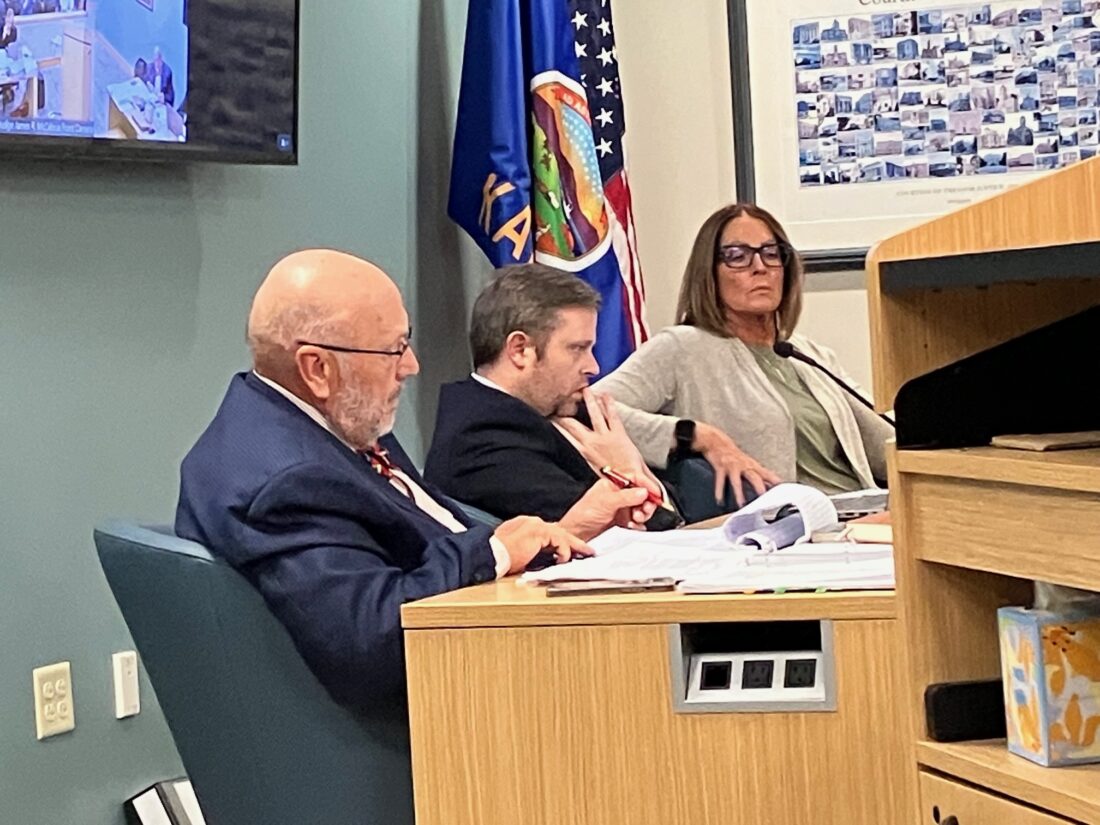
photo by: Kim Callahan/Journal-World
Carrody Buchhorn, right, is pictured Tuesday, Oct. 28, 2025, in Douglas County District Court. Attorney Bill Skepnek is at left, and attorney Quentin Templeton is at center.



